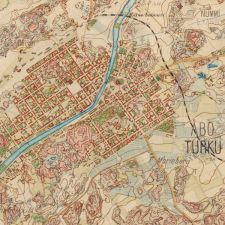Arto's Blog
| « Change of the year greetings | Special edition of positive news » |
New job on environmental and cultural data
Posted: 2008-12-03 22:42:23, Categories: General, Work, Finland, Free software, Literature, Politics, 865 words (permalink)
 My
half-time
work experiment felt good enough that I'm doing it again.
Same employer (CSC), 80 hours per
month contract until end of May 2009. This time I'm working on
services providing storage and access to environmental and cultural
data. There are opportunities to study topics I care about and
participate in making design choices, which makes the deal even more
attractive than last time.
My
half-time
work experiment felt good enough that I'm doing it again.
Same employer (CSC), 80 hours per
month contract until end of May 2009. This time I'm working on
services providing storage and access to environmental and cultural
data. There are opportunities to study topics I care about and
participate in making design choices, which makes the deal even more
attractive than last time.
Geographic information wants to be free
A lot of geographic information and data about natural resources is gathered around the world by governmental research institutes. The U.S. has been fairly open with providing access to such data while in Europe most institutes have been sitting on their databases and selling information with very restricted terms. Now the situation is slowly changing, partly due to an OECD recommendation which suggests open access to research data from public funding. The community maintained OpenStreetMap project has challenged closed models, and increasing popularity of partly open privately funded services such as Google Maps plays a role as well. The INSPIRE EU directive (see also the Ministry of Agriculture and Forestry INSPIRE page in Finnish) aims towards interoperability and sharing of geographical data, although its level of required openness falls behind the OECD recommendation.
In Finland, there's a lot of high quality data but it is scattered and little used outside the organizations collecting it. Many voices are raised in support of open access, for example in the Pätevä seminar two weeks ago. In practice progress is rather slow. The public research institutes are pointing towards the Ministry of Finance and the law about fees of public services (Maksuperustelaki) which their funding models are partly based on. Curiously, the key reason for fees in the law is to avoid causing harm to private companies competing in the same domain. However, many sources show (meteorology example) that business overall benefits from freely available public information. A fundamental change of government policy is needed in order to have open access by default also in Finland.
My first task in October was to contribute a little bit to a survey which reviews the current state of geographic information related data in Finland, and gives suggestions on what should be done. The survey focused on what data exists, how to make it available and usable for officials, researchers and politicians, and interoperability issues between different datasets. For example different coordinate systems and semantics are a big hindrance to cross analysis. I personally believe that increased openness will gradually help to improve lower level data compatibility as well. Fully open access raises strong opinions both in favor and against, but there seems to be a more general consensus that at least researchers should have convenient access to data.
(Added a link to the survey on geographic information related data on May 31, 2009)
Preserving cultural data for the next 100 years
Since beginning of November I'm participating in the National digital library project, which is about access, usability and long term preservation of Finnish cultural data. The Finnish National Archives and the National Library are digitizing old books, newspapers and other documents. In this case, open access gladly seems to be the default for at least old works whose copyrights have expired. You can already check out 18th and 19th century newspapers with full text search or municipal documents dating back until Middle Ages. The picture of this blog entry is part of a map of Turku in 1881, retrieved from the National Archives (see the full map). Several Finnish museums are also digitizing their collections. Many new documents, photos, movies and modern art works are already digital when they are created.
Preserving all this material reliably for tens and hundreds of years is a challenging task. The lifetime of computer and storage systems is around five or at most a couple of dozen years. Text in a paper book stays readable for centuries, but digital data will have to be continuously transferred to new, yet unseen storage systems. Current file formats and software to access them will become outdated over time. Human error or attack can have much greater impact in the digital archive than spilling coffee over one book in a physical library.
CSC does not take part in the digitization, but we are currently working on a preliminary requirements specification for the long term storage. Finland is not the first country thinking about it so there's a lot of material available. However, nobody has a complete and definitive solution to the problem yet. There are chances to do pioneering work and contribute to best practices also internationally.
On a personal level, I find projects on environmental and cultural data both very interesting. One challenge is where to focus energy in order to make a difference instead of getting lost between committee meetings and bureaucracy. Another challenge will be to keep work from ruling life, by reserving enough time for hobbies and rest. In November I already surpassed my 80 hours by 50%, not counting when work topics were in my thoughts during free time. However, that's still less than full time and I don't mind working hard if it feels important and rewarding. The half time contract has been a good starting point.
1 comment

Copyright Arto Teräs <ajt@iki.fi>, licensed under the Creative Commons Attribution-Share Alike 3.0 Unported License. (Unless otherwise mentioned in individual photos or other content.)